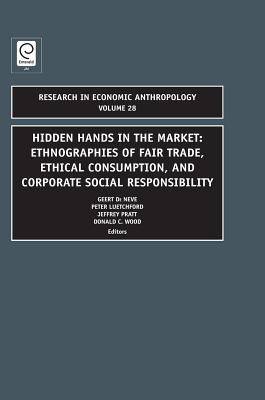
- Retrait gratuit dans votre magasin Club
- 7.000.000 titres dans notre catalogue
- Payer en toute sécurité
- Toujours un magasin près de chez vous
- Retrait gratuit dans votre magasin Club
- 7.000.0000 titres dans notre catalogue
- Payer en toute sécurité
- Toujours un magasin près de chez vous
Hidden Hands in the Market
Ethnographies of Fair Trade, Ethical Consumption and Corporate Social Responsibility
86,45 €
+ 172 points
Description
In much of the world's economy, production, exchange and consumption are regulated by the Market, which is widely believed to be based on economic rationality and driven by a desire to consume. But there are different views of how the Market operates, or ought to operate. This collection of essays discusses a series of alternative perspectives - manifested in ethical movements, alternative consumer behaviour, and social corporate responsibility initiatives - that seek to reveal the 'hidden hands' of power, inequality and morality that shape Market exchange. Against the impersonality of the Market, we find initiatives, such as local food movements, that seek to re-embed commodity exchange in social relationships. Against the idea of the open economy, we find initiatives that seek to counter the ever-widening gap between producers and consumers. Against increased extraction from less powerful economic actors, we find ethical movements, such as Fair Trade, that work to return a fair share of the price to producers and workers. And, against the unfettered Market, we encounter a move to re-regulate trade and protect those located in the most vulnerable market positions. The volume engages with a range of alternative ethical perspectives and the initiatives to which they give rise. Twelve essays - all based on first-hand ethnographic studies of alternative trade movements, corporate social initiatives and consumer behaviour - provide the groundwork for wide-ranging theoretical engagement and comparative analysis. The case studies cover a range of places, commodities and initiatives, including Fair Trade and organic production activism in Hungary, CSR discourses in South Africa and Europe, Fair Trade coffee in Costa Rica and handicrafts made in Indonesia. The essays contribute to a series of current debates within the social sciences about what drives alternative Market engagements, how they are understood and represented by different actors, and what makes their outcomes often ambivalent or contradictory. They address disjunctions between discourses and practices, and internal inconsistencies within ethical movements and corporate initiatives. The volume as a whole engages with questions about morality and the economy, the creation and circulation of value, and, ultimately, the possibility of making alternatives work. In doing so, the contributors reveal the many fields of power at work within the Market as well as within the movements advocating more ethical economic relationships. The volume will be of particular interest to social scientists, business and management studies scholars, and a range of practitioners.
Spécifications
Parties prenantes
- Editeur:
Contenu
- Nombre de pages :
- 272
- Langue:
- Anglais
- Collection :
- Tome:
- n° 28
Caractéristiques
- EAN:
- 9781781901571
- Date de parution :
- 01-08-12
- Format:
- Livre broché
- Format numérique:
- Trade paperback (VS)
- Dimensions :
- 150 mm x 226 mm
- Poids :
- 517 g

Les avis
Nous publions uniquement les avis qui respectent les conditions requises. Consultez nos conditions pour les avis.





